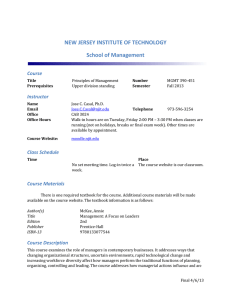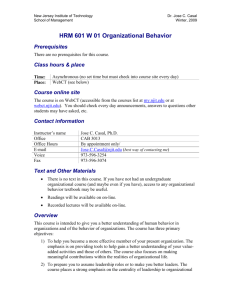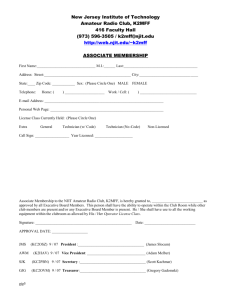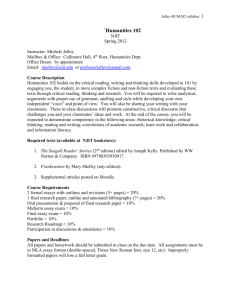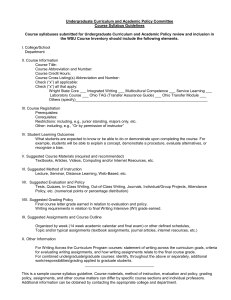HRM 301 Organizational Behavior
advertisement
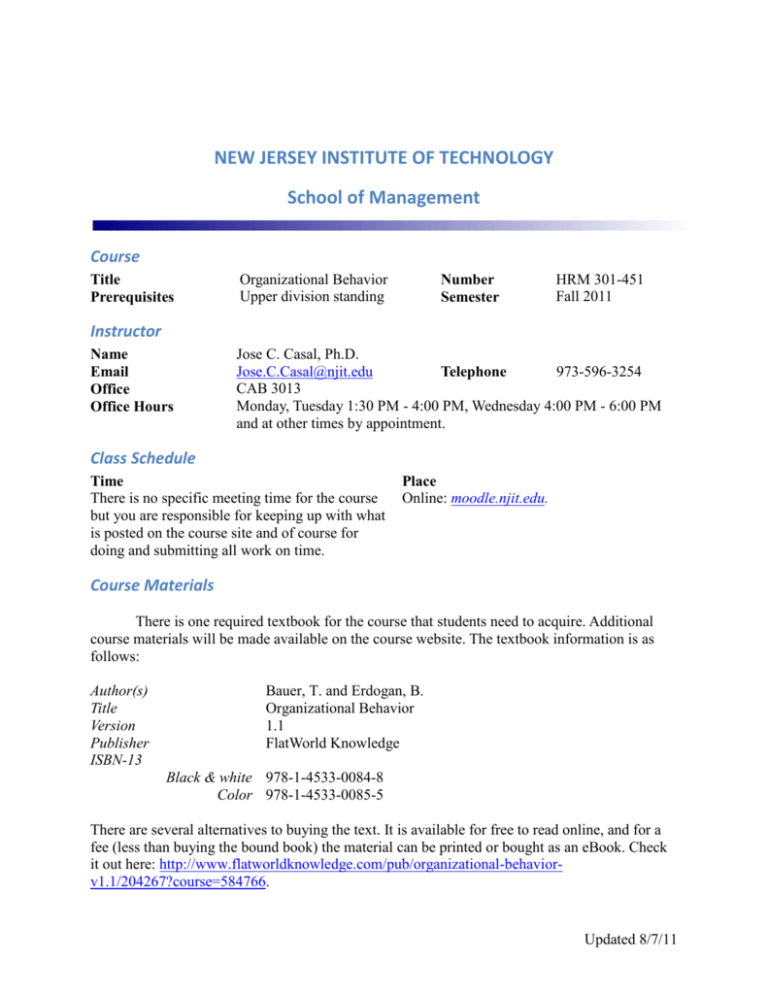
NEW JERSEY INSTITUTE OF TECHNOLOGY School of Management Course Title Prerequisites Organizational Behavior Upper division standing Number Semester HRM 301-451 Fall 2011 Instructor Name Email Office Office Hours Jose C. Casal, Ph.D. Jose.C.Casal@njit.edu 973-596-3254 Telephone CAB 3013 Monday, Tuesday 1:30 PM - 4:00 PM, Wednesday 4:00 PM - 6:00 PM and at other times by appointment. Class Schedule Time There is no specific meeting time for the course but you are responsible for keeping up with what is posted on the course site and of course for doing and submitting all work on time. Place Online: moodle.njit.edu. Course Materials There is one required textbook for the course that students need to acquire. Additional course materials will be made available on the course website. The textbook information is as follows: Author(s) Title Version Publisher ISBN-13 Bauer, T. and Erdogan, B. Organizational Behavior 1.1 FlatWorld Knowledge Black & white 978-1-4533-0084-8 Color 978-1-4533-0085-5 There are several alternatives to buying the text. It is available for free to read online, and for a fee (less than buying the bound book) the material can be printed or bought as an eBook. Check it out here: http://www.flatworldknowledge.com/pub/organizational-behaviorv1.1/204267?course=584766. Updated 8/7/11 HRM 301 451 Syllabus Prof. Casal Fall, 2011 Course Description Your work life is likely to involve organizations. You may work for an organization others created and own. You may create your own business enterprise and have others work for you. Even if you take a career path that keeps you out of business organizations, it is likely that you will interact with them. The study of organizational behavior will help you understand how people and organizations function. Organizational behavior is the study of individuals and groups in organizations and includes such topics as: organizational structure, power and politics in organizations, organizational culture, employee attitudes and motivation, decision-making and leadership. Course Objectives The goal of this course is to help you effectively manage your relationships with managers, coworkers and subordinates. At the end of the course, you should have a better understanding than you did at the beginning of: 1. 2. 3. 4. 5. 6. 7. What the organizations we work in are like, their structure, politics and culture What we bring to work- our individual differences How we react to work- our attitudes and emotions What motivates us How decisions are made in organizations The different forms leadership can take How all of the above can impact organizational performance. Course Outline This outline provides an approximate schedule for the course. Minor adjustments to the assignments should be expected since the pace of a course is difficult to predict. More exact dates are on the course website. All readings are from the text except where otherwise noted. Week Topic Reading 1 Introduction 2 3 Organizational structure Syllabus Ch. 1 Ch. 14 Organizational power and politics Ch. 13 4 5 6 Organizational culture Ch. 15 Individual differences Ch. 2 Tests Hand-In Assignments Test 1 Test 2 Ch. 3 Page 2 of 6 HRM 301 451 Syllabus Prof. Casal Fall, 2011 Week 7 8 9 10 11 12 13 14 Topic Reading Work behaviors, work attitudes and emotions Ch. 4 Ch. 7 Ch. 5 Ch. 6 Handouts Ch. 11 Ch. 12 Motivation Careers Decision making Leadership Course wrap up Tests Hand-In Assignments Test 3 Assignment 1 Test 4 Assignment 2 Test 5 Assignment 3 Required Work and Grading % of Grade Tests 70 Assignments 24 Participation 6 Tests There are 5 tests in this course, each worth 14 % of the course grade. Each test will cover about two topics (in terms of the text, two chapters). The tests consist of multiple-choice questions and are online. Details as to the tests are on the course website. Curve: Tests will be curved by adding to each test the difference between a perfect score and the highest grade. Make-Ups: Missed tests cannot be made up. Exceptions will be made in the case of extraordinary circumstances. Assignments There are three assignments in this course together worth 24 % of the course grade (approximately 8 % per assignment). Details as to the assignments are on the course website. Curve: Assignment grades will not be curved. Late Assignments: Assignments will be accepted up to three calendar days late (Saturday, Sunday and holidays count) at the cost of 3 1/3 points off per day late. Assignments will not be accepted more than three days late. Exceptions will be made in the case of extraordinary circumstances. Page 3 of 6 HRM 301 451 Syllabus Prof. Casal Fall, 2011 Make-ups: Missed assignments cannot be made up. Exceptions will be made in the case of extraordinary circumstances. Participation Participation in the class is worth 5 % of your course grade. Throughout the semester, there will be activities posted on the course website for you to do, e.g. answer a questionnaire, comment on a topic in the discussion forum. Some of the activities are set before the beginning of the semester, others are triggered by events during the semester and so I can't tell you how many there will be. You will have at least a week to engage in the activity. Participation is graded pass (you did what I asked) or fail (you didn't do what I asked). The percentage that you passed of all the activities posted will be your grade. Curve: Participation is not curved. Late or Missed activities: Missed activities must be done on time and cannot be made up. Exceptions will be made in the case of extraordinary circumstances. Attendance Because this is an online class, attendance takes refers to logging in to the course website at least once a week. Attendance itself is not graded but your work is likely to suffer if you are not keeping up with the course. Grading Scale The conversion of percentage points to letter grade is as follows: A B+ B C+ C D F 89.9 up to 100 86.9 up to 89.9 79.9 up to 86.9 76.9 up to 79.9 69.9 up to 76.9 59.9 up to 69.9 0 up to 59.9 Course Policies E-mail communication Students are to use their NJIT e-mail (ucid@njit.edu) and no other e-mail provider (Yahoo, Hotmail, etc.) in communicating with the instructor. Page 4 of 6 HRM 301 451 Syllabus Prof. Casal Fall, 2011 Computer Requirement and Access to the Internet NJIT requires all students to have access to a computer at their place of residence. Details as to this requirement may be found on the college’s website on the page describing NJIT’s Undergraduate Student Computer Requirement. Access to the Internet is required for this course. NJIT provides on campus access to the Internet to all students. Details as how to access the Internet as well as other resources at NJIT may be found in the Student Quick Start Guide. Deadlines/Late Work/Make-ups Specific policies concerning the acceptance of late work and make-ups are discussed in the sections covering course requirements. In general, work will not be accepted late and makeups will not be given. Exceptions will be made when extraordinary circumstances were responsible for work not being completed on time. Students may need to contact the Dean of Students’ office and have it determine that the reasons given for not doing the work on time are valid. Extraordinary Circumstances The predictable demands of family, work and other courses do not constitute extraordinary circumstances. Students are expected to be able to balance these with this course’s demands. Students are also expected to take reasonable steps to deal with problems that may arise and to prevent them from arising. Chief among these is not to procrastinate. Murphy’s Law that “anything that can go wrong will go wrong” frequently holds true. Being locked out of the class because of late paying tuition is not considered an extraordinary circumstance beyond a student’s control unless it can be documented that the Bursar’s Office or Financial Aid has made an error. Inability to access the Internet or Moodle is not considered an extraordinary circumstance beyond a student’s control unless the outage is for 12 hours or more and due to a failure of NJIT’s systems, not the student’s Internet service provider or computer. Incompletes Incompletes will be given only to students who cannot finish the course on time due to major reasons outside of their control (e.g. illness, family tragedy, military service). Students may need to contact the Dean of Students’ office and have it determine that the reasons given for not doing the work on time are valid. Page 5 of 6 HRM 301 451 Syllabus Prof. Casal Fall, 2011 Students with disabilities Students with disabilities needing accommodations of any nature so as to have a fair opportunity to perform in the class need to contact the counseling center. Staff at the counseling center will determine what constitutes a reasonable accommodation and inform the instructor of what it is. Honor Code You are required to follow NJIT’s honor code, which can be found at http://www.njit.edu/doss/policies/honorcode/. Page 6 of 6
